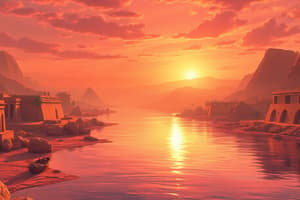Podcast
Questions and Answers
Which oasis is known for its distinctive location, surrounded by steep cliffs on three sides?
Which oasis is known for its distinctive location, surrounded by steep cliffs on three sides?
- Fayum Oasis
- Wadi Rayan depression
- Qattara depression
- Siwa Oasis (correct)
Which type of deposits can be found on the floor of the Qattara depression?
Which type of deposits can be found on the floor of the Qattara depression?
- Limestone formations
- Sand and pebbles
- Granite boulders
- Sabkha deposits (correct)
Which depression is known for being one of the largest and deepest undrained natural depressions of the Sahara?
Which depression is known for being one of the largest and deepest undrained natural depressions of the Sahara?
- Fayum depression
- Siwa Oasis
- Wadi Rayan depression
- Qattara depression (correct)
Which oasis lies in the shadow of the southern edge of the limestone plateau?
Which oasis lies in the shadow of the southern edge of the limestone plateau?
Which of the following regions is characterized by the presence of sandstones belonging to the 'Nubia Formation'?
Which of the following regions is characterized by the presence of sandstones belonging to the 'Nubia Formation'?
Which region in Egypt is famous for its diverse marine life and popular diving spots?
Which region in Egypt is famous for its diverse marine life and popular diving spots?
Which canal in Egypt serves as the connection between the Mediterranean Sea and the Red Sea?
Which canal in Egypt serves as the connection between the Mediterranean Sea and the Red Sea?
What type of rock primarily forms the southern province of the Western Desert?
What type of rock primarily forms the southern province of the Western Desert?
Which oasis in the Western Desert is known for being entirely surrounded by escarpments?
Which oasis in the Western Desert is known for being entirely surrounded by escarpments?
Which depression in the Western Desert is recognized as one of the largest and deepest natural depressions?
Which depression in the Western Desert is recognized as one of the largest and deepest natural depressions?
Flashcards
Egypt's Red Sea coast
Egypt's Red Sea coast
Part of Egypt known for diverse marine life and popular diving spots, located on the Sinai Peninsula.
Suez Canal
Suez Canal
Canal connecting the Mediterranean and Red Seas in Egypt.
Western Desert (Egypt)
Western Desert (Egypt)
Egyptian desert region, characterized by plateaus, rocky ground, and depressions; not a coastal area.
Qattara Depression
Qattara Depression
Signup and view all the flashcards
Alexandria, Egypt
Alexandria, Egypt
Signup and view all the flashcards
Qattara Depression Deposits
Qattara Depression Deposits
Signup and view all the flashcards
Siwa Oasis Location
Siwa Oasis Location
Signup and view all the flashcards
Nubian Sandstone Location
Nubian Sandstone Location
Signup and view all the flashcards
Western Desert Limestone Plateau
Western Desert Limestone Plateau
Signup and view all the flashcards
Qattara Depression Description
Qattara Depression Description
Signup and view all the flashcards
Study Notes
Lecture 2
- Egypt occupies a significant portion of northeastern Africa
- The Nile River supplies regular water to Egypt
- The Nile Valley in Egypt has high population density
- The Gulf of Suez separates the Eastern Desert and Sinai Peninsula
- The Nile Valley receives water from southern highlands
- Egypt's population density varies greatly between habitable areas and deserts
- Herodotus used the terms "Arabian" and "Libyan" Desert to describe the deserts east and west of the Nile
- The Nile Valley and Delta area of Egypt is along the final stretch of the Nile
- The Nubia section of the Nile has a relatively gentle gradient
- The western side of the Nile Valley near Assiut has lower cliffs
- The Rosetta and Damietta branches of the Nile spread into the Mediterranean Sea
- The Fayum depression lies to the west of the Nile Valley
- Birket Qarun is a lake located in the Fayum depression
- The alluvial floor of the Nile Valley averages 10 km in width between Aswan and Cairo
- The Great Desert Belt spans North Africa and Arabia
- The Eastern Desert and Sinai Peninsula are geographically part of one region, but divided
Lecture 3
- Egypt's Western Desert has unconnected depressions to the west
- The Nile River divides Egypt into two distinct regions
- The rainfall in Egypt's Western Desert averages 1cm per year
- Assiut is 260㎞ north of Qena
- Egypt's cultivable lands are generally wider west of the Nile
- Egypt's Eastern side of the Nile Valley has cliffs over 300m high
- The Qattara depression has an area of approximately one million km²
- The Nile Valley region has a population exceeding 1,500 per square kilometer
- The Western Desert contains sandstone plateaus and wadis
- The southernmost point of the Nile Valley is Aswan
- The Red Sea coast of Egypt has diverse marine life and popular diving spots
- The Suez Canal connects the Mediterranean Sea to the Red Sea
- Alexandria is called the “Pearl of the Mediterranean”
- The Western Desert is primarily a plateau with rocky ground and depressions
- The Western Desert features a significant amount of sand dunes and rocky plateaus
- Qattara depression is one of Egypt's largest and deepest depressions
- The Siwa Oasis is renowned for its hot springs and therapeutic properties
- The Western Desert has ancient settlements of significance
- The Western Desert has fossilized remains of prehistoric animals
- The Western Desert’s oases are notable for date and olive cultivation
- Important geological features in the Western Desert are various plateaus and depressions
- The Western Desert has various geological formations, depressions/plateaus/hills
- Various oases in the Western Desert have specific characteristics (size, shape, etc.)
- The Western Desert has numerous depressions including Qattara
Studying That Suits You
Use AI to generate personalized quizzes and flashcards to suit your learning preferences.




